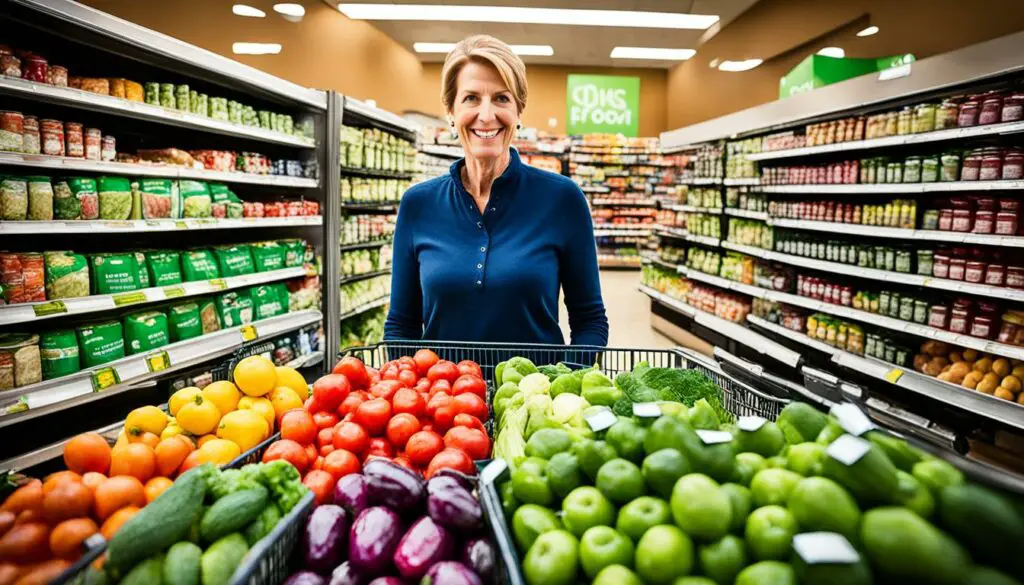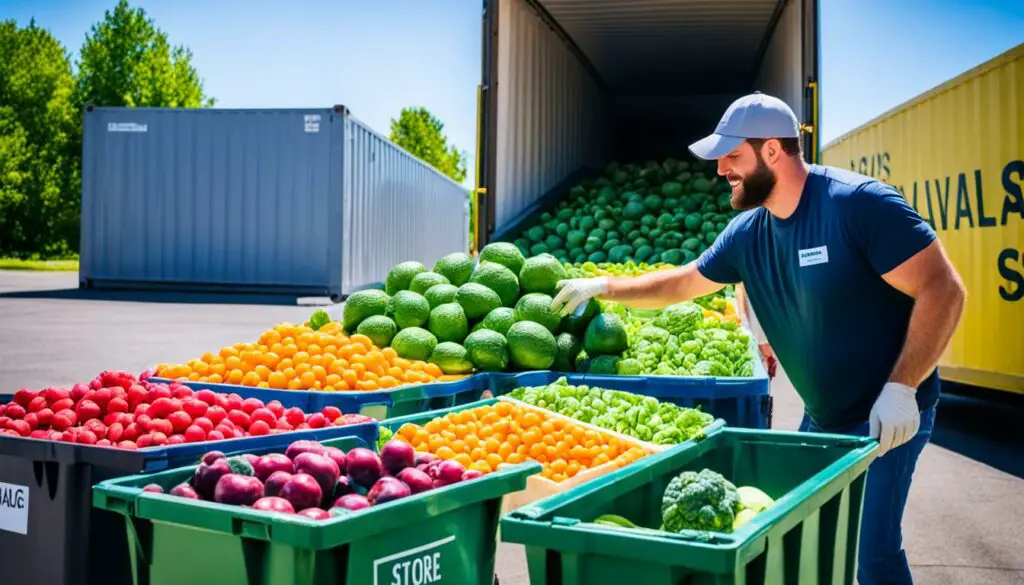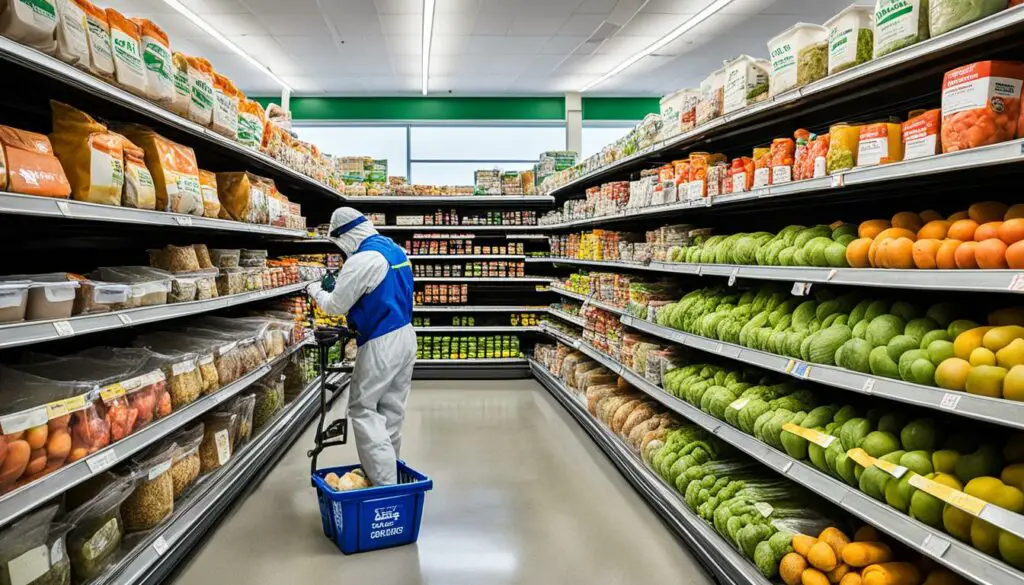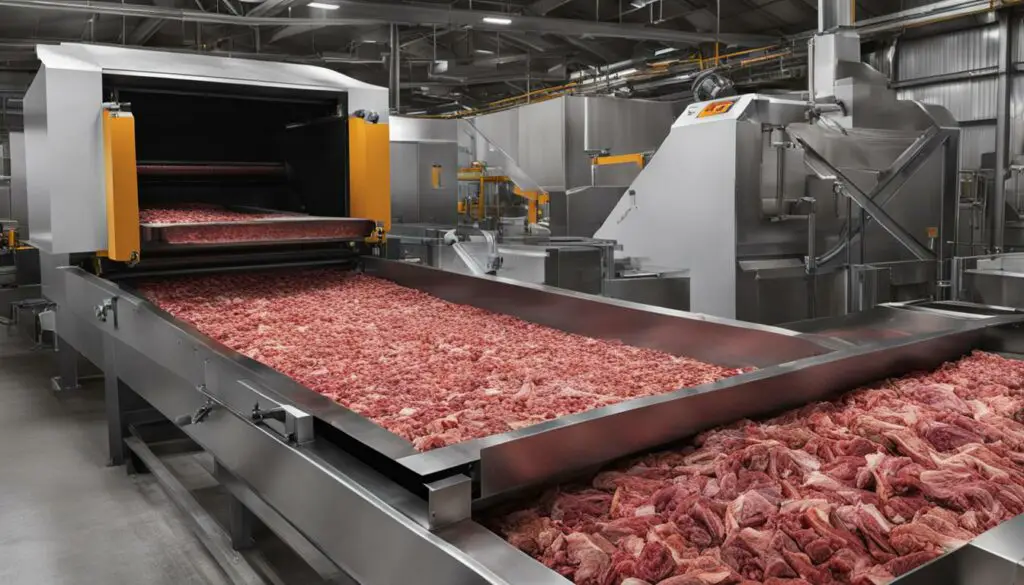Have you ever wondered what happens to the unsold food in grocery stores? It’s a common concern for both consumers and businesses alike. Grocery stores in the U.S. face the challenge of dealing with large amounts of unsold food every year. This can include products that are approaching their expiration dates or are no longer at peak quality.
But what do grocery stores actually do with this unsold food? Well, the answer may surprise you. While some of it unfortunately ends up being thrown away, a significant portion is actually donated to food banks or sold to salvage stores. These practices not only help reduce food waste but also have positive social and environmental impacts.
Table of Contents
Key Takeaways:
- Grocery stores donate unsold food to food banks, helping to feed those in need and reducing food waste.
- Salvage stores purchase unsold and outdated food products at a discounted price, preventing them from going to landfills and offering affordable options to consumers.
- Some grocery stores repurpose unsold food in their in-store deli and salad counters, ensuring it is consumed before spoiling and minimizing waste.
- Butcher shops and meat departments sell meat scraps to rendering companies, repurposing them into proteins for pet food and other industrial uses.
- Grocery stores implement waste management and sustainability initiatives, such as composting and anaerobic digestion, to minimize their environmental impact.
In this article, we will explore these practices in more detail, highlighting the efforts grocery stores are making to reduce food waste and contribute to a more sustainable food system. By understanding what happens to unsold food in grocery stores, we can all play a part in minimizing waste and promoting a healthier and more environmentally-conscious society.
Donating to Food Banks

Many grocery stores have established relationships with local food pantries and organizations to donate food that is still safe for consumption but might not meet the standards for sale. Bruised produce, blemished fruits, and damaged packaging can be donated to help feed those in need. Food banks rely on donations from grocery stores, with over 30% of their total food supply coming from retailers. This practice not only helps reduce food waste but also improves the public image of grocery store chains.
The Impact of Food Donation Programs
“By donating unsold but still safe-to-eat food to food banks, grocery stores play a vital role in reducing food waste and ensuring that individuals and families facing food insecurity have access to nutritious meals.” – Emily Johnson, Director of XYZ Food Bank.
Food donation programs implemented by grocery stores have a significant impact on reducing food waste and supporting communities in need. These programs involve donating surplus and unsold food items that are still safe for consumption but may no longer meet the standards for sale. By partnering with local food pantries and organizations, grocery stores can make a difference in addressing food insecurity while also promoting sustainable practices.
Food banks heavily rely on donations from grocery stores to meet the demand for emergency food assistance. In fact, more than 30% of the food supply in food banks comes from retailers. By donating bruised produce, blemished fruits, and items with damaged packaging, grocery stores ensure that these products are put to good use instead of going to waste.
Aside from the immediate benefit of reducing food waste, donating to food banks also positively impacts the public image of grocery store chains. It showcases their commitment to social responsibility and sustainability. Shoppers are increasingly drawn to stores that prioritize sustainable practices, which can ultimately contribute to increased customer loyalty and support.
Benefits of Food Donation Programs
Implementing food donation programs provides several key advantages for grocery stores:
- Reduces food waste: By donating unsold but still edible food, grocery stores can significantly decrease the amount of food ending up in landfills, thereby reducing their environmental impact.
- Enhances brand reputation: Engaging in food donation programs demonstrates a commitment to social responsibility, strengthened community relationships, and improved brand perception among customers.
- Helps address food insecurity: Donations to food banks directly support individuals and families facing food insecurity, ensuring they have access to nutritious meals.
- Tax benefits: In many countries, including the United States, grocery stores can receive tax deductions for the value of the donated food, providing a financial incentive for participation.
Overall, food donation programs play a vital role in reducing food waste, supporting communities, and promoting sustainable practices in grocery stores. By establishing partnerships with food banks, grocery stores can make significant contributions to addressing food insecurity while positively impacting their own operations and reputation.
| Benefits of Food Donation Programs | Explanation |
|---|---|
| Reduces food waste | Donating unsold but still edible food helps minimize the amount of food sent to landfills, contributing to environmental sustainability. |
| Enhances brand reputation | Participating in food donation programs shows a commitment to social responsibility and improves the public perception of grocery store chains. |
| Helps address food insecurity | Donations to food banks directly support individuals and families in need, ensuring access to nutritious meals. |
| Tax benefits | Grocery stores can receive tax deductions for the value of donated food, providing a financial incentive for participation. |
Selling to Salvage Stores

Salvage stores play a crucial role in reducing food waste by offering a solution for grocery stores to dispose of unsold and outdated food products. These stores cater to cost-conscious consumers who seek discounted prices on expired foods, providing an eco-friendly alternative to prevent the unnecessary disposal of edible items.
Grocery stores sell surplus food to salvage stores at reduced prices, ensuring that these products do not end up in landfills. This practice not only reduces food waste but also creates an opportunity for consumers who may not be able to afford regular supermarket prices to access affordable and perfectly edible food.
“By selling to salvage stores, grocery stores can effectively manage their surplus food disposal, contributing to a more sustainable and eco-friendly approach in the retail industry.”
Selling to salvage stores not only aligns with the goal of reducing food waste in grocery stores but also promotes sustainable practices in the industry. By repurposing unsold and outdated products, salvage stores help create a circular economy where food that would have gone to waste is given a second chance to be consumed.
By diverting surplus food away from landfills and offering affordable options to consumers, the partnership between grocery stores and salvage stores contributes to a more sustainable and socially responsible food system.
Benefits of Selling to Salvage Stores:
- Reduces food waste in grocery stores, preventing edible items from ending up in landfills.
- Provides an affordable option for cost-conscious consumers.
- Promotes sustainable and eco-friendly grocery store practices.
- Contributes to the creation of a circular economy by repurposing unsold and outdated products.
In-Store Usage

One effective strategy for reducing food waste in supermarkets is the in-store usage of unsold food items that are still fresh. Grocery stores utilize these items by incorporating them into their in-store deli and salad counters. By doing so, they ensure that the food is consumed before it spoils, minimizing waste and implementing effective grocery store waste management.
Repurposing unsold food in this manner not only helps the store manage its waste but also has a positive environmental impact. By preventing the disposal of edible food, grocery stores contribute to a more sustainable food system. This practice aligns with the growing awareness of the importance of reducing food waste in supermarkets and promotes eco-friendly grocery store practices.
Integrating unsold food into in-store offerings also benefits customers. They have access to a variety of freshly prepared deli items and salads, providing more options while also minimizing food waste. This approach not only reduces waste but also adds value for customers, as they can enjoy a wide selection of high-quality, ready-to-eat options.
By recognizing the value of unsold but still usable food items and utilizing them within their store operations, grocery stores demonstrate their commitment to sustainable practices and actively contribute to grocery store waste management. This approach not only benefits the environment but also enhances the reputation of these stores as socially responsible establishments.
| Benefits of In-Store Usage for Grocery Store Waste Management |
|---|
| – Minimizes the amount of food waste generated by grocery stores |
| – Contributes to a more sustainable food system |
| – Provides customers with fresh, ready-to-eat options |
| – Enhances the reputation of grocery stores as socially responsible |
Rendering and Repurposing Meat Scraps

Butcher shops and meat departments in grocery stores play a significant role in minimizing food waste through the rendering and repurposing of meat scraps. These scraps, which include bones and fat, are often sold to rendering companies that specialize in repurposing inedible meat into various products.
The rendering process involves the extraction of protein and other valuable components from the meat scraps, which are then used in the production of pet food, animal feed, and even industrial products. By repurposing these scraps, grocery stores not only reduce waste but also contribute to the circular economy by finding alternative uses for byproducts that would otherwise be discarded.
By participating in these sustainable practices, grocery stores actively contribute to minimizing food waste in supermarkets and implementing effective waste management strategies. This commitment not only benefits the environment but also ensures that valuable resources are utilized efficiently.
Reclamation Centers and Surplus Grocery Stores
Retailers often face the challenge of dealing with unsaleable items in their inventory. These items include damaged products, out-of-season items, and even dangerous or spoiled food. To handle the disposal of these items, supermarkets and wholesale distributors operate reclamation centers. These centers play a crucial role in grocery store waste management, ensuring that dangerous or spoiled food items are properly disposed of, while also minimizing food waste.
Reclamation centers employ various methods to handle these unsaleable items. Some products may be sold to salvage stores, offering consumers the opportunity to purchase them at discounted prices. This not only helps reduce food waste but also provides affordable options for consumers who are looking to save on their grocery expenses.
Additionally, reclamation centers also play a critical role in supporting food banks and donation programs. Any remaining unsold and outdated products that are still safe for consumption can be donated to food banks, helping to address the issue of food insecurity. These donations contribute to reducing food waste in grocery stores and ensuring that surplus food reaches those in need.
One example of a surplus grocery store that takes advantage of these unsold and outdated products is the Country Discount Grocery. This store offers a wide range of discounted items, including surplus products from grocery stores, reducing food waste and providing budget-friendly options to consumers.
Benefits of Reclamation Centers and Surplus Grocery Stores
The involvement of reclamation centers and surplus grocery stores in the disposal of unsaleable items brings several benefits:
- Reduces food waste: By diverting unsold and outdated products from landfills, reclamation centers and surplus grocery stores play a vital role in minimizing food waste in the grocery industry.
- Supports the community: Donating safe and edible surplus food items to food banks ensures that those facing food insecurity have access to nutritious meals.
- Offers affordability: Surplus grocery stores provide consumers with the opportunity to purchase discounted products, catering to budget-conscious individuals and families.
- Promotes sustainability: By repurposing unsold items, reclamation centers and surplus grocery stores contribute to the overall sustainability efforts of the grocery industry, minimizing its environmental impact.
Reclamation centers and surplus grocery stores play a crucial role in the overall ecosystem of grocery store waste management. They provide a sustainable solution for handling unsaleable items while reducing food waste and meeting the needs of both retailers and consumers.
Waste Management and Sustainability Initiatives
Many grocery stores are actively implementing waste management and sustainability initiatives to reduce their environmental impact and combat the issue of food wastage. These eco-friendly grocery store practices not only help reduce food waste but also contribute to a more sustainable and responsible food system.
Composting Unused Food
One of the strategies adopted by grocery stores is the composting of unused food. Instead of throwing away food items that are no longer suitable for sale, these stores compost them to create nutrient-rich soil. This compost can then be used for gardening and farming purposes, minimizing waste and promoting sustainable agriculture practices.
Recycling Packaging Materials
Grocery stores are also taking steps to recycle packaging materials to reduce waste. They encourage customers to bring their reusable bags and provide recycling bins for plastic, paper, and other packaging materials. By promoting recycling, grocery stores are actively contributing to the reduction of landfill waste.
Utilizing Anaerobic Digesters
Another innovative solution adopted by major grocery store chains, such as Kroger and Whole Foods Market, is the utilization of anaerobic digesters. These digesters convert food waste into energy or compost through a natural biological process. By generating renewable energy or creating compost, grocery stores can efficiently manage their waste and minimize their carbon footprint.
Economic Benefits of Food Donation
Food donation programs not only help reduce food waste in grocery stores and contribute to sustainable practices but also have significant economic benefits for the stores themselves. By donating perishable items, grocery stores create room on their shelves for fresher and higher-priced products, ultimately improving their profitability.
Furthermore, food donation initiatives play a crucial role in building a positive perception of the grocery stores among consumers. By offering quality items and actively participating in food donation programs, stores attract discerning customers who value fresh and high-quality products. This can lead to increased customer loyalty and a willingness to pay a premium for items from socially responsible and sustainable businesses.
The economic benefits of food donation align with the growing consumer demand for sustainability and socially responsible practices. Shoppers are increasingly conscious of the environmental and social impact of their purchases, including the reduction of food waste. By actively engaging in food donation programs, grocery stores demonstrate their commitment to addressing these concerns and differentiate themselves in the marketplace.
Overall, food donation programs not only support communities in need but also provide a strategic advantage for grocery stores, facilitating profitability, customer loyalty, and a positive reputation as environmentally conscious and socially responsible businesses.
| Economic Benefits of Food Donation |
|---|
| 1. Improved profitability by creating room for fresh and higher-priced products |
| 2. Increased customer loyalty and willingness to pay a premium for socially responsible products |
| 3. Alignment with consumer demand for sustainability and reduced food waste |
Conclusion
The issue of reducing food waste in grocery stores and implementing sustainable practices in grocery store waste management is crucial for creating a more environmentally friendly and socially responsible food system. Through various strategies such as food donation programs, selling to salvage stores, in-store usage, and waste management initiatives, grocery stores have the opportunity to make a positive impact.
By participating in food donation programs, grocery stores not only reduce food waste but also contribute to the well-being of their communities. The donation of perishable items not only helps those in need but also improves the profitability of the store by creating space for fresher and higher-priced products. Additionally, food donation aligns with the increasing consumer demand for sustainable and socially responsible practices, attracting discerning customers who value quality and freshness.
Furthermore, grocery stores can minimize food waste by selling unsold products to salvage stores, repurposing them for in-store usage, or rendering and repurposing meat scraps. These innovative solutions simultaneously reduce waste and offer cost-conscious consumers affordable options. Additionally, waste management initiatives such as composting, recycling packaging materials, and utilizing anaerobic digesters play a vital role in reducing the environmental impact of grocery stores.
By embracing sustainable practices and finding innovative solutions to reduce food waste, grocery stores can create a more sustainable food system. These efforts not only benefit the environment and the community but also foster economic growth and improve the public image of grocery store chains. It is crucial for grocery stores to prioritize reducing food waste in their operations and take responsibility for managing their waste in a sustainable and efficient manner.
FAQ
What do grocery stores do with unsold food?
Grocery stores have various practices in place to manage unsold food. Some stores donate the food to food banks or sell it to salvage stores. Others repurpose the food in their in-store deli and salad counters. Meat scraps may be sold to rendering companies. Additionally, some unsold items are sent to reclamation centers for disposal or sale to salvage stores or donation to food banks.
Why do grocery stores donate food to food banks?
Grocery stores donate food to food banks to reduce food waste and contribute to the community. Donation programs help provide emergency food assistance and support those in need. It also creates room on the shelves for fresh products and improves the store’s profitability. Donating food can also enhance the store’s public image and attract socially conscious customers.
How do salvage stores help reduce food waste in grocery stores?
Salvage stores purchase unsold and outdated food products from grocery stores at a lower price. This prevents the food from ending up in landfills and provides cost-conscious consumers with discounted options. Selling to salvage stores reduces waste and can also benefit grocery stores by recovering some of the costs from unsold products.
How do grocery stores use unsold food in-store?
Grocery stores repurpose unsold food items by using them in their in-store deli and salad counters. This ensures that the food is consumed before it spoils and reduces waste. By repurposing unsold food, stores can effectively manage their waste and minimize their environmental impact.
What happens to meat scraps in grocery stores?
Butcher shops and meat departments in grocery stores often sell their meat scraps, such as bones and fat, to rendering companies. These companies repurpose the inedible meat scraps into proteins for pet food and other industrial uses. This practice reduces waste and contributes to the circular economy by finding alternative uses for meat byproducts.
What are reclamation centers and how do they help reduce food waste?
Reclamation centers, operated by supermarket chains or wholesale distributors, handle the disposal of dangerous or spoiled food items. They also handle unsaleable items, such as damaged or out-of-season products. These centers sell the remaining items to salvage stores or donate them to food banks. Surplus grocery stores purchase these unsold and outdated products and sell them at discounted prices, reducing food waste and offering affordable options to consumers.
What waste management and sustainability initiatives are implemented by grocery stores?
Many grocery stores implement waste management and sustainability initiatives to reduce their environmental impact. These practices include composting unused food, recycling packaging materials, and utilizing anaerobic digesters to convert food waste into energy or compost. Some major chains even own and operate their own anaerobic digesters to efficiently manage waste and generate renewable energy.
What are the economic benefits of food donation for grocery stores?
Food donation programs have economic benefits for grocery stores. Donating perishable items creates room on the shelves for fresher and higher-priced products, improving the store’s profitability. Additionally, food donation helps build a perception of offering quality items, attracting discerning customers who are willing to pay a premium for fresh and high-quality products. This practice also aligns with the growing consumer demand for sustainability and socially responsible business practices.
How do grocery stores contribute to reducing food waste?
Grocery stores contribute to reducing food waste through various strategies such as donating to food banks, selling to salvage stores, repurposing unsold food in-store, utilizing rendering companies for meat scraps, and implementing waste management and sustainability initiatives. These practices not only reduce food waste but also have economic, social, and environmental benefits. By implementing sustainable practices and finding innovative solutions to food wastage, grocery stores can contribute to a more sustainable food system while meeting the needs of their customers and the community.
Source Links
- https://www.theatlantic.com/health/archive/2012/01/second-life-what-happens-to-old-and-expired-supermarket-products/251052/
- https://www.thekitchn.com/what-happens-to-grocery-store-waste-the-grocery-insider-218928
- https://news.northeastern.edu/2023/02/17/why-do-grocery-stores-donate-unsold-food/
See also:
Leave a Reply